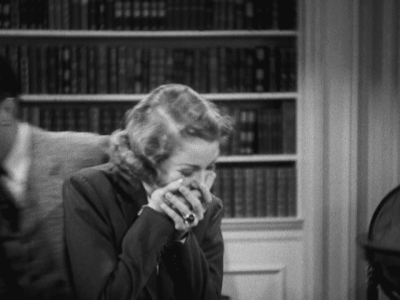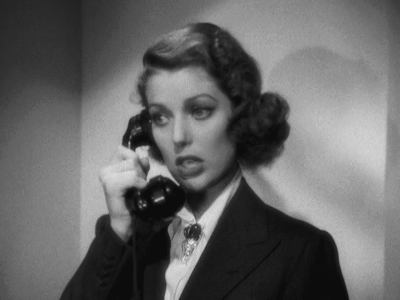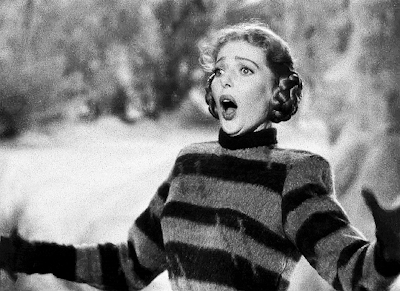#ClassicFilmReading: The Things I Had to Learn by Loretta Young
My summer reading continues with a memoir from Loretta Young!
The Things I Had to Learn was published in 1961 and is as glossy as it is glossed over. That's not to say that I didn't love it, because I did. This is a perfectly frothy PR exercise and it works.
I put this book down with the opinion that Loretta Young is a charming, eloquent, talented woman who was often ahead of her time in seeing trends and reacting to change, despite knowing that she was pretty pious and straight-laced and was never one to (openly) broker scandal.
As Helen Ferguson (her long-time PR person and I think ghostwriter, since this is billed as "As told to Helen Ferguson") writes, Loretta's favourite quote is "You can't begin to know anything until you know you know nothing," and it's evident in this book that Loretta is going to show us everything she's learned after a lifetime in Hollywood.
There are stories of her early Hollywood career (which began as an extra as a four-year-old), her family life (it was just Loretta, or Gretchen, her real name, her mother and her sisters because her father walked out on them), and her teenage years (she dreamt of stardom, wanted to be a glamorous teen, and learned how to be grateful).
There are stories of her big break (Colleen Moore discovered her on set as a teenager, induced the studio to sign her, and gave her the name Loretta) and how she struck out as a freelancer at a time when the studio system was a well-oiled machine (she prayed on it and gave up a two-million-dollar contract but it worked out in her favour).
The tougher details of her life don't make it in (there's no reference to Clark Gable in conjunction with their daughter Judy, he's only mentioned in the context of making Key to the City in 1950), and though she does reference hard times and struggle, it's always polished with a veneer of 'Well, I made it, didn't I?' which is a great attitude to have, but if you're asking Loretta Young to put her life in context of her tragedies, it's not there. Another example of this is that a health scare in the mid '50s is repeatedly referenced but never named, although it's a serious enough health scare that she required blood transfusions.
Of course, this is written in the midst of her marriage to Tom Lewis. Her acrimonious divorce is still eight years away at this point, and from what I've read from other sources, it was a protracted legal battle over money and assets (he apparently convinced her to sign over 50% of her assets from both the marriage and before they were married).
She's still mightily in love with Tom throughout this (though reading this in the context of a modern woman, the way he courts her is sketchy to me. He just shows up at her house one Sunday morning insisting that she go to early Mass with him. She'd declined because she was going to a party on the Saturday night and wanted to have a lie in before going to the late morning Mass, but he insisted because he was also going to the party, and if he could wake up early, so could she).
Throughout it all, though, is her faith. Loretta was a devout Catholic and led her life subscribing to those beliefs and letting them guide her. She prayed constantly and listened to her conscience to guide her. Despite the characters she played, she wanted them all to be moral and have stories to tell. She was kind and giving and was bolstered by the belief that if it was meant to happen, it'd happen.
I can't say that I relate to her faith, since I'm not particularly religious (nor am I Catholic), but I like that her belief appears to be one of kindness and openness. There isn't piety here to make me believe she might've actually been judgmental and cruel like some very devout people (of any religion) can be. Her mother was constantly teaching her lessons about how to love and lead with grace and kindness.
There isn't a lot of gossip in this book, mostly because Loretta is too nice to say anything mean about people (though she does reserve some criticism for people she keeps unnamed), but here's what she does share: when she was sick and couldn't film The Loretta Young Show, Barbara Stanwyck was the first star to sign up as a guest host, even though she was a "dyed-in-the-wool TV hold-out"; Irene Dunne was one of her favourite people and she once gave her lamps from her own home because she thought they better suited Irene's house; and she considered Norma Shearer to be one of the most "exquisitely groomed, best-dressed, feminine women in the world"; and Janet Gaynor one of the most talented.
The Farmer's Daughter
Since there isn't a lot of gossip here, I'm going to share what she wrote about The Farmer's Daughter, which is one of my favourite movies (and maybe controversially, I think she deserved that Oscar?).
- At one point Helen Ferguson calls Loretta's Oscar win for The Farmer's Daughter as the all-time Oscar upset, which is funny with the benefit of history, but I guess at the time, she was the all-time upset (although this was published in 1961, so after Grace Kelly beat out Judy Garland, for what it's worth).
- She almost turned it down because she wasn't blonde, Swedish, and spoke without an accent. Dory Schary convinced her to make the movie.
- She studied with an accent coach, Ruth Roberts, who she writes "coached Ingrid Bergman out of her accent, coached me into mine."
Ultimately, though this is a very polished, very favourite telling of Loretta Young's life, either by her or by her PR person, it's still worthy reading if you want to know more about the ethos of how Loretta lived her life.
And if you have book recommendations about Loretta by other sources, I'm all ears. Leave them in the comments!





Enjoyed your review! I also can't stop staring at that book cover. It's lovely. I'm not a Loretta Young fan but I don't think I'd mind reading this one (with a grain of salt of course).
ReplyDeleteI enjoyed your review! I'm a big Loretta fan and liked the later book FOREVER YOUNG by Joan Anderson; Loretta spoke with her late in her life about issues like Judy with the understanding that the book be published posthumously, if I remember the details correctly. I have been fortunate to speak with Loretta's daughter-in-law Linda on multiple occasions and she made clear that Loretta was a wonderful lady; like anyone, she wasn't perfect, but she tried hard to live up to her ideals. Best wishes, Laura
ReplyDelete